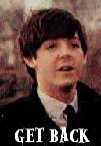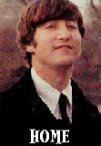

QUESTION: With the publication of Fifty Years Adrift, is there any more to be said about the Beatles?
DEREK TAYLOR: I'll answer that. I wanted to do it and did it and that should really be it. It was nice to do it, but we should draw the line there and publish some fiction.
GEORGE: One reason I liked him writing it was there have been so many [Beatle] books - and no doubt they'll be many more - written by people who are so-called experts and ninety-percent is lies or just written from other sources. So it's good to have a book that's from an indide point of view, but also isn't particularly nasty. Because there's a tendency of people to always take a negative approach. I think this book is more interesting, more revealing and at the same time it's not just stabbing you in the back like a lot of people because they think it means making more money.
QUESTION: Do you still have a present hold in the movie industry?
GEORGE: The movie business? Yeah, at the moment I'm negociating to buy the rights to Fifty Years Adrift and make into a movie with Robert De Niro playing Derek Taylor.
QUESTION: Who would play George Harrison?
GEORGE: Oh, he'd just be a minor part. We'd get on of the Rutles or something like that.
QUESTION: George, what about music, what's that in your life these days?
GEORGE: Well, I don't have to make rcords any longer, which is a relief to go because I'm not really of the competitive nature. I don't want to have to go out there doing all this stuff which is necessary now. Let's face it, it's a cutthroat business and I'm not really into that, so I no longer have to make records. Since I don't have a committment to the music indusrty; I've been writing much more music than in the past. For instance, the last couple of months I've written about twenty-eight songs and I make demos which are better because they can be of good quality When you get to making a record, though, it's something serious.
QUESTION: Will you perform live again?
GEORGE: What do you think this is? This is a day's work. You mean musically, I don't know. I doubt it, it's too much trouble. Besides, I'm not sure anybody wants to see me.
QUESTION: Could you tell us the story from the book about how the Beatles got their name?
GEORGE: There's always been stories about who invented the name and about we wanted it like the Crickets, but Stu Sutcliff was very much into Marlon Brando, particularly his movie The Wild One. Then in the years following it was always taken that John thought of the name. Recently, I came across a video of Thw Wild One and I couldn't believe it when I saw Lee Marvin saying to Brandon, "We think you're a schmuck, Johnnie, and the Beatles think you're a schmuck." Wait a minute, back that up. Did I hear that, "the Beatles?" And so that's how it happened and I mentioned it and they went and found the script, so based on that I would say that Stu had a lot to do with it.
QUESTION: Derek, how did you get the job as press officer to the Beatles?
TAYLOR: I slipped into it having been appointed personal assistant to Brian Epstein. I got the job because old colleagues on the press started to ring me up saying, "Come on, we know you're in there." And I'd say,"I'm not the press officer, he's in the other room." So they'd say, "You can't give us that..."
GEORGE: And the press officer we had was useless. I think we all benefited when Derek got that position because we knew their needs having been with a press man. We trusted his ability not to sacrifice us to them. i think it worked quite well.
TAYLOR: If there wasn't such a volume of press, it would have been a comfortable job. I felt not only a duty but a compassion for the individuals in the mass that were coming at us. They all had separate and competitive needs which I understood and tried to meet which was very difficult. But it was a pleasure because it was a good gang, wasn't it?
GEORGE: Yeah, I had fun.
QUESTION: How did your interest in the Hare Krishna movement come about?
GEORGE: I bought a record of the Hare Krishna mantra and I was familiar with it from my trips to India. It's not exactly a new thing, it was in the West, It's the Vedic culture in India. I met A.C. Bhaktivedanta Swami, who's the spiritual master, a few years after he came to the West and he was a great, great old man. He was wonderful and I was friendly with him. I knew a few of the guys and they were all trying to get temples here and there and I got them a temple in London once. I appreciate it, but I'm not as closely associated as people think. For instance, I wasn't here receiving sancified food [prasadam] last night like it said in the Daily Herald. I mean, I like them, but in some ways the Krishnas are like groupies because they think, well George is into it, so they all come. One of the things their master taught was the first problem in the world is that we all encroach upon each other and so what do they do? They do it to me, out of love maybe. Nevertheless, there's a limit to how many Krishnas you can meet in a day or one lifetime. The philosophy is great, however, and I wish them all the best.
QUESTION: George, what is it like for you to come out in public. It must be difficult even to walk down the street.
GEORGE: It's sort of strange. I don't do this very often and so I've forgotten how to act and I'm not quite sure how you do it.
QUESTION: What do you think of the music industry in 1984?
GEORGE: I think it's sort of picking up and getting a bit better. There are some things I genuinely like whereas a few years ago there was absolutely nothing. I don't know what's in your top twenty, but it tends to be the same in every country. It will get better as soon as we have program planners and disc jockeys that don't have to bow to the sponsors because that's the problem. Ten years ago when I was more actively involved you'd get a playlist and the DJ's were allowed to play maybe three new records a week. Now you have each record company maybe putting out twenty or thirty and there's fifty record companies. It's usually the program planner, for his own personal motives or whatever he's getting, backhanders, or how much you go and bow and scrape to them, they're the records that will get played. I'm not really into that anymore. We [the Beatles] genuinely got popular by people just playing our records because they liked them. I don't see the business settling down. It's going to get more and more about money, greed, and selfishness and on that basis people have tin ears as far as I'm concerned I hear stuff that's happening now and people are just tone-deaf but with fifteen million selling albums. It takes all kinds.
QUESTION: Everyone's avoided discussing John Lennon's death, but what about Paul mcCartney's life since the Beatles? Do you still listen to Paul and keep in touch? What is your relationship with the other Beatles?
GEORGE: I recently have been very much in touch with Paul and musically I think "No More Lonely Nights" is a lovely song. I haven't seen his movie [Give My Reguards to Broadstreet], so I can't comment.
QUESTION: What do you think of his new treatments of the old Beatles numbers?
GEORGE: Well, I've not really heard it all. I've heard "Eleanor Rigby" and "For No One," I think. I can't understand why he did it. It makes he think he got the publishing or something back off Sir Lew Greed.
QUESTION: Do you think it's sacrilegious?
GEORGE: No. He wrote the songs. If I wanted to sing "Here Comes the Sun," is that sacrilegious? I mean, I wrote it. Paul wrote those songs and he can do them. I think he shouldn't have done so many of them. He's not doing so bad.
QUESTION: Have you come across Julian Lennon and what do you think his future will be?
GEORGE: I have't seen him over the last two years, but before that I spent a lot of time with him. I try to give him a bit of help and direction. He went through a couple of years of going to clubs and being sucked into situations he should have avoided. I think now, having done that, he's a much wiser person. I've seen him on TV doing interviews and singing his songs. I think he's got a great future as a musician and as a songwriter. And as a human, he's real charming. He's got the smartness of John, but he's got a softer edge. He's a sweetheart.
QUESTION: How do you feel about the death of John Lennon?
GEORGE: Everybody in this room has had friends who've died or parents, relatives or something. It's a particularly unhappy affair at the best of times. Let alone when some loony does it. It affects you the same as Ghandhi, or Mrs. Ghandhi or Kennedy, except it's a bit closer to home.
QUESTION: Do you take extra precautions these days?
GEORGE: Well, I've been taking extra precautions before he was killed in as much as I try not to let people know where I am except today, unless any one of you are thinking of shooting me...
QUESTION: What about your family's security? Do you take special precautions? Is that an ongoing worry for your family?
GEORGE: The only ongoing worry is the way people take something, whether it's real or false and for the sake of filling a bit of print they hype some mad story. That doesn't help. I think that contributed to John's downfall in a way. If you noticed, before he got shot there was an upsurge in publicity saying, "He's got three apartments and a cow that cost $2,000 or something." We can all be positive or negative, but like we said earlier reguarding people writing books about the Beatles, there does seem to be a tendency for people to be nasty rather than nice. And I think the press must accpept the responsibility for a lot of the attitudes prevalent in society. They have direct responsibility for educating, or at least not retarding a man's consciousness. As you sow so shall you reap.
TAYLOR: And on that we'll see you again. Thank you.

